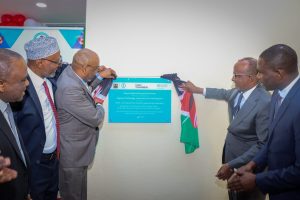By Aoma Keziah,

The Ministry of Health has officially inaugurated the expanded Polio Laboratory at the Kenya Medical Research Institute (KEMRI), a facility set to play a central role in the fight against polio and other infectious diseases in the region.
The event was presided over by Health Cabinet Secretary Aden Duale, joined by the KEMRI Board Chair and Director General, Development partners at the institute’s headquarters in Nairobi.
“This facility has supported the Ministry of Health in conducting robust surveillance through advanced diagnostics, including from acute flaccid paralysis and environmental samples. Its work in cell culture, virus isolation, and molecular characterization has been critical in ensuring rapid detection and response to polio outbreaks,” stated CS Duale.
The Health CS further stated that until recently, sequencing of polioviruses had to be done in South Africa or at the Centres for Disease Control and Prevention in Atlanta, USA.
“This meant long delays before results confirmation. Such delays not only hampered surveillance but also slowed our outbreak response,” he added.
The laboratory, which functions as both Kenya’s National Reference Laboratory and an Inter-country Reference Laboratory, will support disease diagnostics and surveillance for Somalia, Djibouti, Eritrea, and Comoros. Officials say the expansion will improve genomic sequencing capacity, shorten turnaround times for outbreak detection, and enhance regional health security.
KEMRI Acting Director General Prof. Elijah Songok, said that for more than 20 years, KEMRI has been hosting the Polio Laboratory, serving both as a Kenya’s National Reference Laboratory and as an Inter-country Reference Laboratory for Somalia, Djibouti, Eritrea, and the Comoros.
“Through this role, we have been at the heart of regional surveillance and diagnostics, contributing directly to the global effort to eradicate polio, an effort that echoes the world’s success in eradicating smallpox in 1979. The expansion of this facility is especially significant because it addresses one of our greatest past challenges,” he remarked.
The expansion is seen as a legacy step in the country’s contribution to global efforts to eradicate polio. It also places Kenya in a stronger position to detect and respond to epidemics more quickly, which experts believe will be vital in managing future health emergencies across the region.




